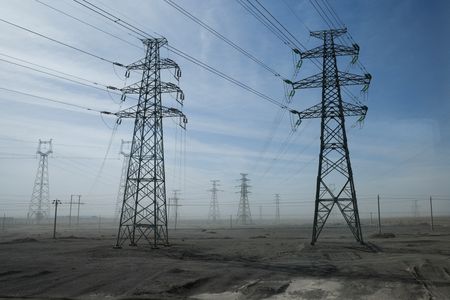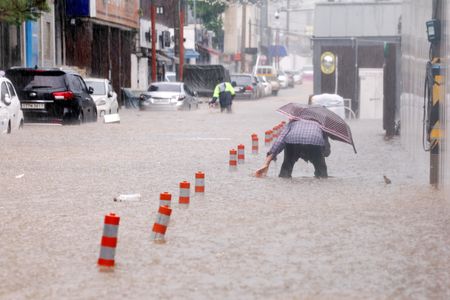By Joe Cash and Xiuhao Chen
BEIJING (Reuters) -Days of broiling record-breaking heat across large swathes of China pushed power demand to an all-time high in excess of 1.5 billion kilowatts, energy officials said.
An arc of sweltering heat spans the densely populated southwestern cities of Chongqing and Chengdu to the southern megaport of Guangzhou, in extremes that meteorologists link to climate change – presenting a major challenge for authorities.
A subtropical high weather system in the northwest and southwest drove temperatures at eight weather stations in the last two days to their highest yet, state media said on Thursday, citing national weather authorities.
“The power system is holding up so far,” said Chim Lee, a senior energy and climate change specialist at the Economist Intelligence Unit.
“But the real test will come as the summer wears on, and there are still risks of potential power rationing.”
Solar energy accounted for half of June’s surge in power generation, and hydropower output nationwide was up on 2023, though still lower than the corresponding 2022 period, Lee said.
The comments came after China’s National Energy Administration flagged a “record high” on Wednesday in the country’s electrical load for the third time this month.
That was an increase of 55 million kilowatts over last year’s maximum. Provincial records have also been broken 36 times since summer began in the world’s second-largest economy.
Besides scorching croplands and eroding farm incomes, higher temperatures can affect manufacturing hubs and disrupt operations in key ports, straining overburdened healthcare.
Every year in the past decade, the southern province of Jiangxi has experienced 21.7 days of temperatures above 28 degrees Celsius (82.4 degrees Fahrenheit) on average, up from five to seven at the turn of the century, state media added.
The heat has persisted so long that in a blog post last week state broadcaster CCTV spotlighted a tradition of people sleeping with wax gourds, vegetables considered effective in absorbing body heat.
In Chongqing, zoo animals were treated to iced watermelons on Wednesday, the official news agency Xinhua said.
There is a chance of some respite, however.
Weather forecasters expect temperatures to begin easing from Monday, as a tropical depression east of the Philippines may strengthen into a tropical storm expected to be named Wipha, and track across Taiwan toward southern China.
However, the low-pressure system could be blocked by the subtropical high, keeping air conditioners running at full tilt and further straining the power grid.
(Reporting by Joe Cash and Xiuhao Chen; Editing by Clarence Fernandez)










